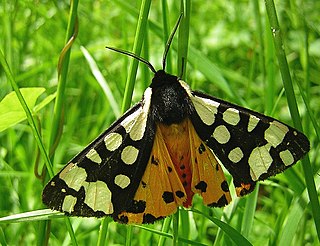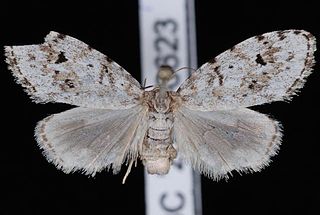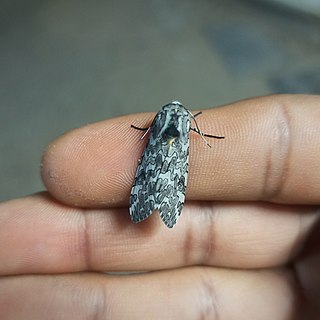
The Arctiinae are a large and diverse subfamily of moths with around 11,000 species found all over the world, including 6,000 neotropical species. This subfamily includes the groups commonly known as tiger moths, which usually have bright colours, footmen, which are usually much drabber, lichen moths, and wasp moths. Many species have "hairy" caterpillars that are popularly known as woolly bears or woolly worms. The scientific name Arctiinae refers to this hairiness. Some species within the Arctiinae have the word "tussock"' in their common names because they have been misidentified as members of the Lymantriinae subfamily based on the characteristics of the larvae.

Alpheus Spring Packard Jr. LL.D. was an American entomologist and palaeontologist. He described over 500 new animal species – especially butterflies and moths – and was one of the founders of The American Naturalist.

Hypercompe is a genus of tiger moths in the family Erebidae erected by Jacob Hübner in 1819.

The Arctiini are a tribe of tiger moths in the family Erebidae.

The Arctiina are a subtribe of moths in the family Erebidae.

Apantesis is a genus of tiger moths in the family Erebidae first described by Francis Walker in 1855. They are found in North and Central America.

Spilosoma is a genus of moths in the family Erebidae originally described by John Curtis in 1825. A very heterogeneous group, it is in need of review by the scientific community, as certain species probably need reclassification into their own genera.

Hypercompe oslari is a moth of the family Erebidae first described by Walter Rothschild in 1910. It is found from the extreme south of Texas south into Mexico.

Clemensia albata, the little white lichen moth, is a moth of the family Erebidae. It was described by Alpheus Spring Packard in 1864. It is found in eastern North America, west across boreal Canada to south-eastern British Columbia. The range extends along the Pacific Coast south to Monterey Bay in west-central California. The habitat consists of moist forests, including coastal rainforests, oak woodlands and mixed hardwood forests.

Hypercompe albicornis is a moth of the family Erebidae first described by Augustus Radcliffe Grote in 1865. It is found on Cuba.
Hypercompe eridanus is a moth of the family Erebidae first described by Pieter Cramer in 1775. It is found in Colombia, Suriname, and French Guiana.
Hypercompe ocularia, the ocularia leopard, is a moth of the family Erebidae. The species was first described by Johan Christian Fabricius in 1775.

Hypercompe ochreator is a species of tiger moth first described by Felder and Rogenhofer in 1874. It is found in Guatemala.
Hypercompe pertestacea is a moth of the family Erebidae first described by Walter Rothschild in 1935. It is found in Peru.
Hypercompe simplex is a moth of the family Erebidae first described by Francis Walker in 1855. It is found in Puerto Rico, as well as on the Virgin Islands and the Lesser Antilles.

Hypercompe suffusa is a moth of the family Erebidae. It was described by William Schaus in 1889. It is found in southern Arizona, western Texas and Mexico.
Hypercompe theophila is a moth of the family Erebidae first described by Paul Dognin in 1902. It is found in Colombia.
Hypercompe turruptianoides is a species of tiger moth first described by Walter Rothschild in 1910. It is found in Brazil.










